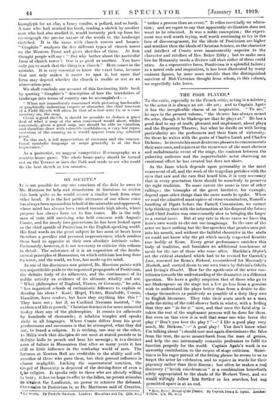ON SOCIETY.*
IT is not possible for any one conscious of the debt he owes to Mr. Harrison for help and stimulation in literature to review this book quite as he would review a similar book from some other hand. It is the last public utterance of one whose voice has always been upraised on behalf of the miserable and oppressed, whose mind has always been turned towards high ideals, whose purpose has always been sot to fine issues. He is the only man of note still surviving who held converse with Auguste Conde, and for nearly two generations he has been looked upon as the chief apostle of Positivism to the English-speaking world. His final words on the great subject he has most at heart have therefore a peculiar and personal impressiveness which renders then, hard to appraise at their own absolute intrinsic value. Fortunately, however, it is not necessary to criticize this volume in detail.. The substance of it is an exposition of the funda- mental principles of Humanism, on which criticism has long done its worst., and tho world, we fear, has made up its mind.
In one of the discourses now printed, Mr. Harrison points with not unjustifiable pride to the organized propaganda of Positivism, the definite body of its adherents, and the continuance of its public activity as evidence of its ultimate vitality and use. "What philosopher of England, France, or Germany," he asks, "has organized schools of enthusiastic followers to explain or develop his ideas ? Kant, Hegel, Fichte, Humboldt, Cousin, Hamilton, have readers, but have they anything like this?" They have not ; but if, as Cardinal Newman insisted, "the evidence of life is growth," Christian Science is far more animated to.day than any of the philosophies. It counts its adherents by hundreds of thousands ; it inhabits temples and speaks daily in all languages. Where Comte differs from his great predecessors and successors is that he attempted, what they did not, to found a religion. It is nothing, one way or the other, to Mill's work that disciples do not meet at stated periods or in definite halls to preach and hear his message; it is a distinct note of failure in Humanism that after so many years it has still so little influence in the workaday world of men. The lectures at Newton Hall are creditable to the ability and self- sacrifice of those who gave them, but their general influence is clmost negligible. Lacking the supernatural sanction, the Gospel of Humanity is deprived of the driving-force of even a fi Ise religion. It speaks only to those who are already willing is hear ; it him no hope to offer to the fallen, no potent stimulus to awaken the Laodiceen, no power to retrieve the debased. Camvetation to Positivism is, as Dr. Martineau said of Creation,
Trolcia !halos. Lsados ; 3iscosillan sod Co, ills. na.]
"rather a process than an event." It relies essentially on educa- tion ; and we regret to say that apparently civilization does not want to be educated. It was a noble conception ; the experi. ment was well wOrth trying, well worth continuing to try in the face of discouragement, for the ideals of Positivism are higher and worthier than the ideals of Christian Science, as the character and intellect of Comte were immeasurably superior .to the character and intellect of Mrs. Baker Eddy ; but to make men live for Humanity needs a diviner call than either of them could utter. As a regenerative force, Positivism is a splendid failure.; as a moral code and inspiration, it has been illustrated by many eminent figures, by none more notable than the distinguished survivor of Slid-Victorian thought from whom, in this volumn, we regretfully take leave.


































 Previous page
Previous page